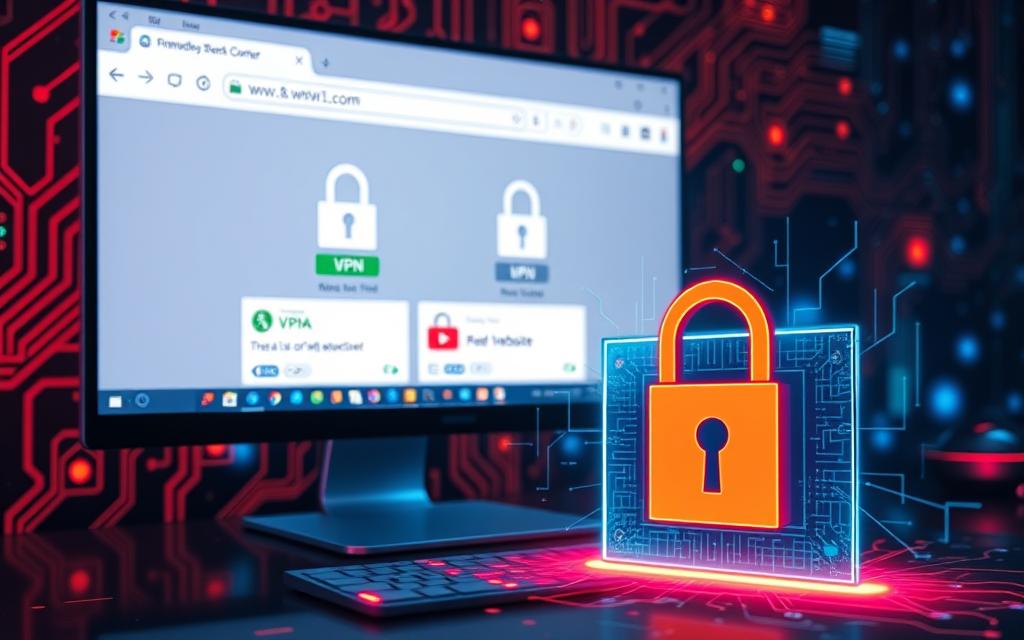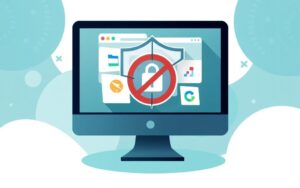Table of Contents
Being able to access the internet with no limits is very important today. Yet, there are many places, like schools or offices, that limit what you can see online. This article shows you ways to bypass these barriers.
We will talk about using a VPN, proxy servers, and browser add-ons. With these methods, you can visit any website you want. They also help keep your online activities safe and private.
Understanding Why Websites Are Blocked
Many websites are blocked for various reasons, aiming to control what we can see online. Content filtering is vital in places like schools and offices. It helps keep the internet safe from inappropriate content. These restrictions help create a focused work environment and protect young users, influencing the digital world we explore.
Common Reasons for Restrictions
Government agencies often apply digital censorship to control public information. They usually target sites with sensitive political content or independent news, reflecting wider policy goals. Internet providers must also follow legal restrictions, blocking sites to obey local laws on copyright issues and harmful content. This includes compliance with the Children’s Internet Protection Act.
Legal and Institutional Blockages
Schools must block access to bad material because of the Children’s Internet Protection Act. This law helps keep the internet safe for kids. Meanwhile, strict legal restrictions in some countries limit freedom of expression and access to different views. Knowing about these limits helps understand why many online resources are unavailable.
Using a VPN to Bypass Restrictions
A VPN, or Virtual Private Network, is key for getting around website and network restrictions. It helps users reach content that’s otherwise blocked due to location or company policies. With more people wanting online freedom, it’s important to look into VPNs.
What is a VPN?
A VPN allows users to send their internet traffic through secure servers. This hides their IP addresses. It creates a secure space, keeping online activities private. This way, users can access content from other countries. VPNs help get around blocks on services like Netflix.
Benefits of Using a VPN
VPNs offer major benefits. They give better online security with strong encryption. This keeps users safe from cyber threats and unwanted tracking. VPNs also unlock content that’s locked in certain regions. They’re great for when internet access is limited, like during government restrictions.
How to Choose a Reliable VPN
Choosing a VPN needs careful thought. Look for strong encryption, a no-log policy, and many server locations. Providers like NordVPN and Private Internet Access are known for their quality. Reading reviews also helps in making a good choice.
How to Unblock Site in PC
To start unblocking sites with a VPN, first pick a VPN you can trust. Installing the software is easy. Just download it, create your account, and sign in. Select a server close to you to get better speeds. Now, you can get into sites that were blocked before.
Step-by-Step Guide for Using a VPN
This VPN setup guide makes it simple:
- Choose a trustworthy VPN service.
- Install the app on your device.
- Make an account and log in.
- Pick a server nearby to improve speed.
- Connect to the server and visit the site you want.
Follow these instructions, and you’ll unblock websites on your PC easily using a VPN.
Configuration for Optimal Performance
For the best VPN settings optimization, try these tips:
- Turn on the kill switch to protect data if you lose connection.
- Use split tunneling to choose which apps use the VPN and which don’t.
- Tweak encryption settings to get the right mix of security and speed.
With these tweaks, your VPN will work better. You’ll browse smoothly and safely.
Utilising Proxy Servers
Proxy servers act as gateways, linking users to the internet. They hide your IP address to boost privacy online. A web proxy definition explains these as platforms enabling access to internet sites without revealing user information. By using proxy servers, people can bypass basic online restrictions and gain extra benefits.
What is a Proxy Server?
A proxy server is a go-between for your device and the internet sites you want to visit. These servers offer various settings for needs like better security. Choosing strong proxy types, such as anonymous ones, makes a big difference. They manage internet use efficiently and can store often-visited web pages, saving bandwidth.
Advantages and Disadvantages of Proxies
The pros and cons of proxy servers show they have both good and bad sides. They make it quick to reach web resources without installing software, great for public computer users. Yet, using proxies without encryption can risk your data and browsing habits, exposing them to danger.
- Pros:
- They’re easy to set up and useful on public computers.
- They can save data by storing commonly visited sites.
- They help get around blocked content online.
- Cons:
- Non-encrypted proxies could leak your data.
- Not all of them can get past tough blocks.
- Free proxies might have security and performance issues.
Picking the right proxy is crucial for making the most of it while avoiding problems. For advice on proxies in Chrome, check out this guide. It has steps and tips for using trustworthy proxies.

Alternative Methods: Using Browser Extensions
Browser extensions are a handy way to unblock websites. They include Hola Unblocker, Collusion, and Proxy Switcher for Chrome users. These tools make it easy to access blocked content right from your browser. You don’t need any extra software.
Popular Extensions for Unblocking Websites
For unblocking sites, Chrome and Firefox have great extensions. Hola Unblocker is praised for its ease of use. Besides, ZenMate provides strong encryption, which keeps your browsing private. You can check both Chrome and Firefox for the best extension for you.
Installation and Usage Instructions
Installing these extensions is easy and open to all. Start by visiting your browser’s web store. Chrome users should go to the Chrome Web Store. Firefox users, head to the Firefox Add-ons site. Find the extension you like, hit install, and follow what’s on the screen. After installing, activating the extension is your next move. This lets you get into websites that were blocked before.
| Extension Name | Browser Compatibility | Features |
|---|---|---|
| Hola Unblocker | Chrome, Firefox | Easy to use, access restricted content |
| ZenMate | Chrome, Firefox | Encryption, privacy tools |
| Proxy Switcher | Chrome | Switch between multiple proxies easily |
| Collusion | Chrome | Blocks tracking, enhances privacy |
Accessing Cached Versions of Websites
Many users face issues accessing websites due to geographical blocks or network restrictions. Thankfully, Google cache and the Wayback Machine provide ways to access cached versions of blocked websites. These alternatives help in retrieving vital information.
Using Google Cache
Google cache is a go-to for older web page versions. If a site is currently down, just do a Google search for its URL. Click the downward arrow next to the search result, and select “Cached” to view a stored version. This is very useful for accessing information from sites that are temporarily unavailable or blocked.
The Wayback Machine Explained
The Wayback Machine is a vast internet archive, saving web pages over the years. To find archived content, simply enter the web page’s URL on the Wayback Machine’s site. It keeps different versions of web pages, making it easy to get older information. This is especially helpful when live sites are down for a long time.
Using these tools boosts our ability to find information that might seem lost. Google cache and the Wayback Machine are key for overcoming internet access barriers.
Changing Device Settings to Unblock Websites
Modifying device settings is key to unblock restricted sites. Start by changing firewall settings, as they can block or allow access to certain sites. Adjusting browser settings can also help, making previously unavailable pages accessible.
Adjusting Firewall Settings
To browse through blocked sites, changing firewall settings is necessary. With administrative access, users can find and adjust the firewall options in their device’s settings. They might disable the firewall temporarily to get unrestricted access. This step is vital for starting the unblocking process through firewall tweaks.
Modifying Browser Settings
To unblock sites in a browser, tweak its settings. Look into the privacy and security options to control website permissions. This may involve managing access to the camera and microphone. Resetting site settings to a more open level might be needed for some browsers.
Conclusion
In today’s world, getting to websites that are blocked is key to free access to information. Using a reliable VPN, like NordVPN which has 6300 servers in many countries, helps a lot. These tools let you bypass internet blocks smoothly.
Browser extensions are another way to get around website blocks. Users can regain their online freedom by using these methods wisely. It’s about making the most of the tools available to navigate internet restrictions.
As more websites get blocked, services like ExpressVPN become essential. They offer a 49% discount on yearly plans and work on various devices. These services not only unblock sites but also protect your online activities with strong encryption.
Google’s Public DNS or the Wayback Machine are also good choices. They help keep your access to a wide range of online content. So, you don’t have to give up on using the internet how you want.
Getting past internet blocks requires knowing the right methods. By getting to know these strategies, including using various blocking techniques, you can better your web experience. It’s about making smart choices online.
FAQ
What is a VPN and how does it help in unblocking websites?
A VPN, or Virtual Private Network, makes your online actions private. It changes your IP address. This helps you visit websites that are blocked in your area.
Why are websites blocked in schools or workplaces?
Websites might be blocked to keep students from seeing bad content. In workplaces, it’s to help people stay focused. Some countries also block information to control what people can see.
Can I use a proxy server instead of a VPN to unblock websites?
Yes, a proxy server hides your real IP address to access websites. But, it might not encrypt your data. So, some blocks might still stop you.
Are there any legal implications for unblocking websites?
Bypassing website restrictions might break laws or rules in some places. Always check the rules in schools or at work before you try it.
What are some recommended browser extensions for unblocking websites?
Extensions like Hola and ZenMate are good for getting past blocks. They fit right into your browser, making things easy without extra software.
How can I use Google cache to access blocked content?
Google saves web pages. To see these saved pages, search for the website. Click the arrow beside its URL, then pick “Cached”. You’ll see an older version of the site.
What settings should I adjust on my device to unblock websites?
You might need to change your firewall or browser settings. Turning off the firewall for a bit or changing site permissions can help get into blocked sites.









